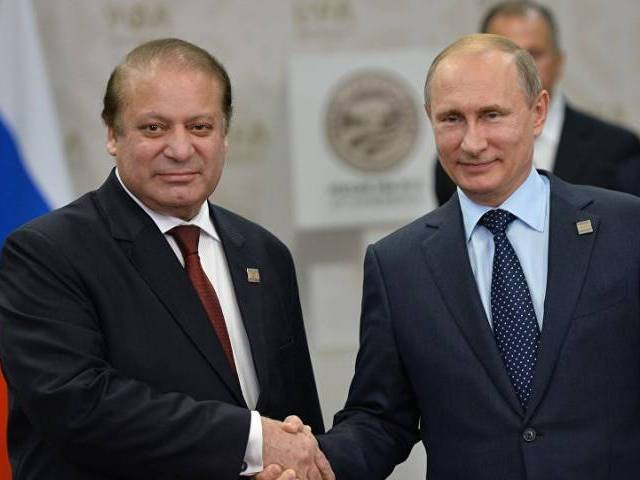CPEC and Russia’s quest for warm water ports
Russia’s prime interest in Pakistan has been investment in the energy sector

PHOTO: AFP
Russian foreign ministry denied any negotiations with Pakistan on joining the China-sponsored corridor to the Arabian Sea via the Gwadar port. The federal minister’s visit 10 days later offered a blunt rejoinder. On its part, the Central Asia Regional Economic Cooperation member state showed its willingness to work with Russia, thus the meeting with Maksim Sokolov, the Russian transport minister.
Turbulent ties
Islamabad and Moscow first interacted on the fringes of the UN General Assembly meeting on May 1, 1948, when Foreign Minister Sir Zafarullah Khan met his counterpart. Zulfiqar Ali Bhutto aspired to create a better bargain for Pakistan by wooing Russia, when he first visited the country in 1960 as Minister of Fuel Power and Natural Resources. Later, he remained actively engaged with Moscow as a foreign minister as well. The engagement eventually led to post-1965 war Tashkent Declaration. Kremlin backed Delhi outrightly as it sponsored Bengali secessionist militancy in 1971. Despite this, the controversial populist leader visited Moscow in 1972 as premier. Later, Russia launched a proxy war against Pakistan after it sided with the Afghan resistance against its military intervention as well as the capitalist bloc.
Moscow not mulling to join CPEC: Russian foreign ministry
Following his father’s footstep, Premier Benazir Bhutto tried to warm relations with Russia in 1994-1995. However, political infighting at home and Moscow’s annoyance over the rise of Taliban factored in adversely. Just months prior to the coup, Prime Minister Nawaz Sharif visited Russia in 1999. But General Musharraf pressed reset on almost everything the Nawaz government was pursuing, and ties with Russia were no exception.
Since Musharraf’s Russia visit in 2003, relations have steadily improved without considerable turbulence. While almost every Pakistan president or premier has visited Moscow since, none were reciprocated at the same level.
In 2015, commandoes from both sides held war-games, while their navies conducted a joint exercise in the northern Arabian Sea. These increasing comfort levels are leading the two nations to previously unchartered waters, the most notable being the sale of MiG-29’s engines, RD-33, for en masse production and likely export of JF-17 Thunder.
The move was preceded by a deal to buy Russian Mil Mi-35 gunships and electronic warfare equipment. Besides inducting initial deliveries of four rotary-wing aircrafts, Islamabad may order another 16 subject to the platform’s performance and budgetary conditions.
Partnership for mutual benefit
Russia’s prime interest in Pakistan has been investment in the energy sector, symbolised by financing of the 850km North-South (Lahore-Karachi) pipeline to securing investment in the Iran-Pakistan gas pipeline. And it remains to be seen if Moscow agrees to invest in the Thar coal field.
If the overview of complicated bilateral relations can be any guide, both the countries are steadily developing ties but are still far from becoming strategic and economic partners. Russia’s defense cooperation with India is at a far advanced level, which for now remains un-deterred by Delhi’s advances to Washington.
CPEC’s western route: Protests may erupt over unkept promises
Of late, Moscow has not shared India’s hardened position against Pakistan, may it be the BRICS summit in Goa or Heart of Asia conference in Amritsar. Islamabad’s recent abstention on the UN resolution regarding Syria was also an effort to stay out of the Pandora’s box.
The offer to join CPEC is too enticing for Russia to out-rightly reject. Its energy projects, such as the pipeline network, may eventually culminate in Russian oil being shipped to the east and the west from Gwadar port. Even if Kremlin may not benefit from the CPEC in the short term, it won’t back India’s rhetoric against the logistical corridor.
Naveed Ahmad is a Pakistani investigative journalist and academic with extensive reporting experience in the Middle East and North Africa. He is based in Doha and Istanbul. He tweets @naveed360



1724319076-0/Untitled-design-(5)1724319076-0-208x130.webp)















COMMENTS
Comments are moderated and generally will be posted if they are on-topic and not abusive.
For more information, please see our Comments FAQ